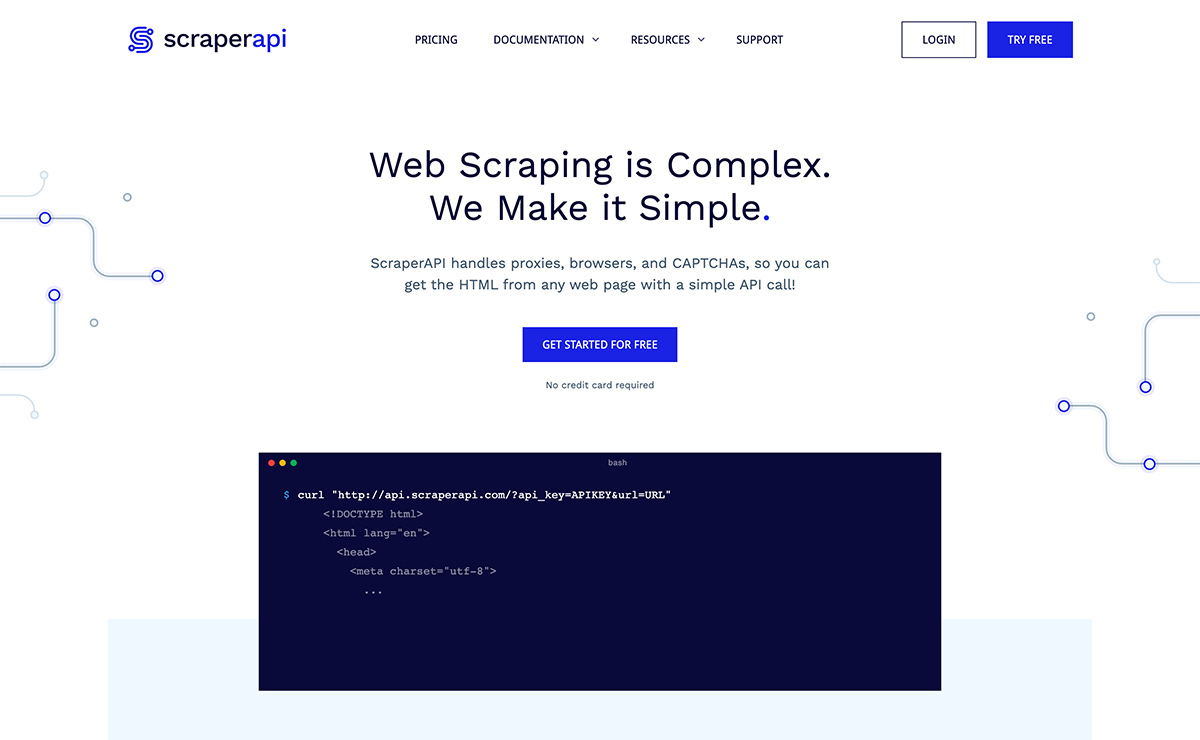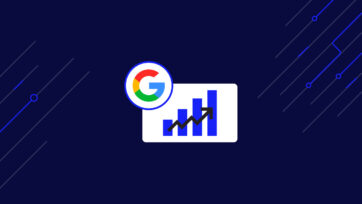With billions of academic papers and research journals, Google Scholar is one of the best online resources for high-quality academic research.
However, as you are probably all too aware, Google doesn’t provide an API to allow you to find and extract the data you need at scale. (Which can be a pain for researchers who want large volumes of data.)
But, all hope isn’t lost. There are a number of ways you can get the data you require. Either through 3rd party APIs or scraping the data you need. In this Google Scholar API and Proxies guide, we’re going to walk you through 5 of the best options currently available, and give you the pros and cons of each.
1. ScraperAPI
ScraperAPI is the first option on our list and a great one at that.
This proxy API makes scraping the web at scale as painless as possible. It is ideal for websites that are difficult to scrape like Google, for example, and it takes the pain out of having to build and maintain your own infrastructure. You simply send the URL you want to scrape to the API and it will handle rotating proxies, automatic retries, CAPTCHAs, and blocks and only give you successful results. From there, your script just needs to parse the data you need from the HTML response.
When combined with a prebuilt Google Scholar scraping library like Scholarly, you can easily create a custom Google Scholar API specific to your data needs in a couple of hours. This makes scraping Google Scholar a breeze.
What is great about this approach is that it is very reliable and very cheap at scale. For only $149 you can extract up to 1,000,000 Google Scholar pages per month. And for those, who need to scrape even more data ScraperAPI offers plans that allow you to scrape tens of millions of pages per month.
You can try out ScraperAPIs very generous free trial with 5,000 free requests here, that other providers charge over $50 per month for. And if you need to scrape more than 3,000,000 pages per month, contact our sales team.
Pros: By far the cheapest web scraping option on this list for those who want to reliably extract Google Scholar data for their research projects. Plus, a very generous free plan.
Cons: You need a basic understanding of web scraping.
2. SERP API
The next option on our list is SERP API, a great option for those who just want Google Scholar data and don’t want to have to build their own web scrapers.
The guys at SERP API have done a great job building an API specifically for Google Scholar that returns all the data found in a typical search result. Including:
- Title
- Link
- Snippet
- Citations
- Publication
- Etc.
The only drawback to this great API is the cost. With plans starting at $50 for 5,000 searches and growing to $250 for 30,000 API calls, this Google Scholar API can be a very costly option if you need a lot of Google Scholar data.
Pros: High quality and easy to use Google Scholar API which returns all the basic information you would need.
Cons: Can be expensive for larger projects and not customizable for your own particular project requirements.
3. SerpWow
Another company providing a third party Google Scholar API is SerpWow. Although not as well documented as SERP API’s Google Scholar API, this API has a lot of the same functionality for a slightly cheaper price.
Simply send your search query to their API and they will return all the Google Scholar search results in JSON format.
With plans starting at $45 for 5,000 API calls it is a great solution if you want a quick and easy way to extract some Google Scholar data. However, like the API solutions on this list, it can get very expensive if you need larger volumes of data – 100,000 API calls is $500 per month.
Pros: Returns data in JSON format and is slightly cheaper than SERP API.
Cons: No dedicated Google Scholar documentation and very expensive at scale.
4. Scale SERP
Scale SERP is the next Google Scholar API on our list. Although looking remarkably similar to SerpWow they actually provide a very similar product at a lower cost.
With plans starting for as little as $4 per month for 250 API calls and growing to 10M API calls for $8500, Scale SERP offers something for everyone.
Like SerpWow and SERP API they return data in JSON format, however, their data isn’t as granular. Favoring only the bare essentials like title, link, author, and snippet. Excluding data like the number of citations, etc.
Pros: The cheapest Google Scholar on the list, but still at least 3X more expensive than ScraperAPI.
Cons: Doesn’t return as detailed data as the other APIs and isn’t customizable.
5. Publish or Perish
The final solution on our list is Publish or Perish a data extract tool specifically designed for Google Scholar, which gives you the ability to create your own Google Scholar API.
Slightly outdated, this open-source desktop application is great for those researchers who want a ready-made solution for extracting small amounts of Google Scholar data.
However, beware as the software will make requests to Google Scholar using your IP address you could get your IP address banned by Google if you try extracting too much data. So if you need to extract more than a couple hundred search results from Google Scholar then you should definitely use a proxy solution like ScraperAPI.
Pros: Completely free and easy to use.
Cons: You run the risk of getting your IP address banned if you use it without using a proxy.
And that’s it folks. Our Google Scholar API and Proxies guide provides 5 of the top APIs and proxy solutions that should be your first choice when looking for a solution to your Google Scholar data needs.
Hopefully one of these top proxy providers is a fit for your Google Scholar scraping needs, but if you still have questions and would like to discuss your particular use case with us, you can contact us. Happy scraping!





